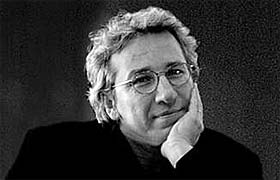Celebrating Honorary Member Can Dündar
Born in 1961 in Ankara, Can Dündar is a journalist, columnist, and documentarian. After completing his studies in journalism in Ankara, Dundar went on to obtain a Master’s degree from the London School of Journalism, and a Ph.D. in Political Science from the Middle East Technical University in Ankara.
Alongside his work as a journalist, Dündar has published over 20 books, produced numerous television programs, and has written and contributed to screenplays and documentaries, most notably Mustafa (2008), chronicling the life of Turkish leader Mustafa Kemal Atatürk, which Dündar wrote and directed.
Dündar’s primary contribution, however, has been his unwavering dedication to a rigorous brand of journalism that unapologetically demands honesty, transparency, and accountability from its government and political parties. It is this very dedication, however, that has unfortunately led him into a position of conflict with the Erdoğan regime – a position in which Dündar, at one point, was forced to choose between freedom of speech and freedom itself.
Dündar has contributed to various print publications over the years, including Hürriyet, Nokta, Sabah, and Milliyet, before being appointed in February 2015 as the editor-in-chief of the center-left newspaper Cumhuriyet. In January 2014, evidence emerged exposing Turkish National Intelligence Agency (MİT) trucks intercepted at the Syrian border, illegally shipping arms to Syrian rebels. The story’s publication in May 2015 immediately situated Dündar and the daily’s Ankara bureau chief, Erdem Gül, as prime targets in a regime that is increasingly stifling the freedom of its press.
President Erdoğan filed an individual criminal complaint against Cumhuriyet; as a result, Dündar and Gül were arrested in November 2015 in Istanbul, and charged with espionage, collecting and disclosing state secrets, and supporting an armed terrorist organization. Dündar and Gül spent over 90 days in pre-trial detention, including periods in isolation and solitary confinement, and although the journalists were freed in late February under a constitutional court ruling, the indictment ultimately led to a conviction on May 6, 2016, in which Dündar was sentenced to a reduced 5 years and 10 months imprisonment, and Gul was sentenced to 5 years. This devastating decision was immediately followed by an equally drastic event: an attempt on Dündar’s life the same day, on the courthouse steps, during which his wife, Dilek, aided in detaining the shooter.
In August 2016, Can Dündar stepped down from his position as editor-in-chief of Cumhuriyet, though he will still be active as a columnist, and tireless in his personal and professional efforts to protect the freedom of the press in Turkey. Throughout his persecution, arrest, detention, trial, and appeal, Dündar was adamant in his position to remain in Turkey, to fight from within its borders to preserve media integrity and protect their rights to a free press. Now, however, upon his release pending appeal, Dündar has left Turkey for the moment, dismayed and unconvinced that he would be able to receive a fair trial under the current regime. Dündar has stated that, “the state of emergency [is] being used the government as a pretext to control the judiciary”, and as such, it would be highly unlikely for him to receive a just, impartial, or public hearing, offering very little hope of the overturn of his conviction.
The already hostile climate for dissidents and opposition in Turkey was exponentially exacerbated by the coup attempt in July 2016. Reporters Without Borders (RSF) names Turkey the “world leader in imprisoned journalists”, and their World Press Freedom Index for 2016 ranks the country as 151st of 180. The organization reports: “[i]n the draconian state of emergency imposed after the abortive coup, the authorities have closed more than 100 media outlets critical of the government, placed 42 journalists in provisional detention and banned many others from travelling abroad”.
Spring 2016 saw the publication of We Are Arrested: A Journalist’s Notes from a Turkish Prison, Dündar’s account of Cumhuriyet’s decision to publish the controversial story, and his subsequent arrest and imprisonment, and the social and political events that led up to and followed the failed July coup.
In March 2016, Norwegian PEN organized a protest outside of Parliament in support of Dündar, Gül, and several other imprisoned or at-risk journalists in Turkey, such as Aslı Erdoğan. At this time, Norwegian PEN also announced its decision to adopt Can Dündar as an honorary member, in celebration of his monumental contributions to the protection of freedom of speech and human rights, particularly in the face of severe persecution, threats, and imprisonment.
Dündar has also been honored with the International Press Freedom Award (Committee to Protect Journalists, CPJ, 2016), and the Prize for the Freedom of Future of the Media (together with Erdem Gül, Leipzig Media Foundation, 2016). Cumhuriyet also received the Reporters without Borders prize in the media category for 2015.
Perhaps Dündar’s merit is best expressed by the words of Jennifer Clement, President of PEN International:
“Can Dündar belongs to that elite of extraordinarily brave journalists who risk everything so the world can know the truth.”



